No quarter , no mercy shown by a victor, who treats a vanquished opponent very harshly or refuses to spare a surrendering opponent's life.
Contents
No quarter may also refer to:
No quarter , no mercy shown by a victor, who treats a vanquished opponent very harshly or refuses to spare a surrendering opponent's life.
No quarter may also refer to:

Led Zeppelin were an English rock band formed in London in 1968. The group comprised vocalist Robert Plant, guitarist Jimmy Page, bassist and keyboardist John Paul Jones, and drummer John Bonham. With a heavy, guitar-driven sound, they are cited as one of the progenitors of hard rock and heavy metal, although their style drew from a variety of influences, including blues and folk music. Led Zeppelin have been credited as significantly impacting the nature of the music industry, particularly in the development of album-oriented rock (AOR) and stadium rock.

Led Zeppelin III is the third studio album by the English rock band Led Zeppelin, released on 5 October 1970. It was recorded in three locations. Much of the work was done at Headley Grange, a country house, using the Rolling Stones Mobile Studio. Additional sessions were held at Island Studios and Olympic Studios in London. As with the prior album, the band eschewed the use of guest musicians, with all music performed by band members Robert Plant (vocals), Jimmy Page (guitars), John Paul Jones, and John Bonham (drums). The range of instruments played by the band was greatly enhanced on this album, with Jones especially emerging as a talented multi-instrumentalist, playing a wide range of keyboard and stringed instruments, including various synthesizers, mandolin and double bass, in addition to his usual bass guitar. As with prior albums, Page served as producer on the album, with mixing done by Andy Johns and Terry Manning.
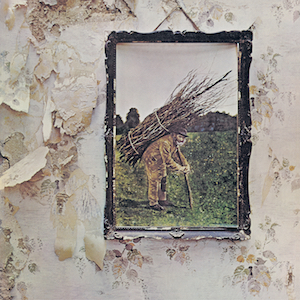
The untitled fourth studio album by the English rock band Led Zeppelin, commonly known as Led Zeppelin IV, was released on 8 November 1971 by Atlantic Records. It was produced by guitarist Jimmy Page and recorded between December 1970 and February 1971, mostly in the country house Headley Grange.
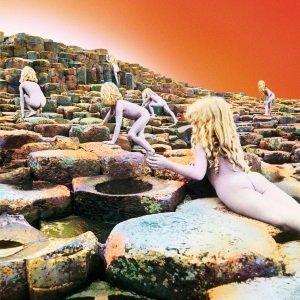
Houses of the Holy is the fifth studio album by the English rock band Led Zeppelin, released on 28 March 1973 by Atlantic Records. The album benefited from two band members installing studios at home, which allowed them to develop more sophisticated songs and arrangements and expand their musical style. Several songs subsequently became fixtures in the group's live set, including "The Song Remains the Same", "The Rain Song" and "No Quarter". Other material recorded at the sessions, including the title track, was shelved and released on the later albums Physical Graffiti and Coda. All instruments and vocals were provided by the band members Robert Plant (vocals), Jimmy Page (guitar), John Paul Jones, and John Bonham (drums). The album was produced by Page and mixed by Eddie Kramer. The cover was the first for the band to be designed by Hipgnosis and was based on a photograph taken at Giant's Causeway in Northern Ireland.
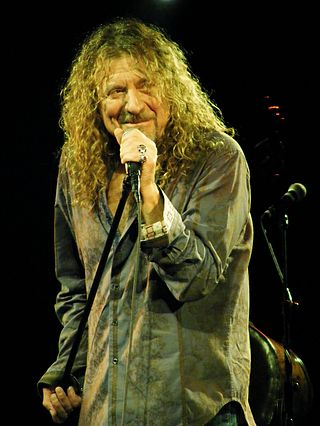
Robert Anthony Plant is an English singer and songwriter. He was the lead singer and lyricist of the rock band Led Zeppelin from its founding in 1968 until 1980, since then he has had a successful solo career, sometimes collaborating with other artists such as Alison Krauss. Regarded by many as one of the greatest singers in rock music, he is known for his flamboyant persona and raw stage performances. In 1995, Plant was inducted with the band into the Rock and Roll Hall of Fame.
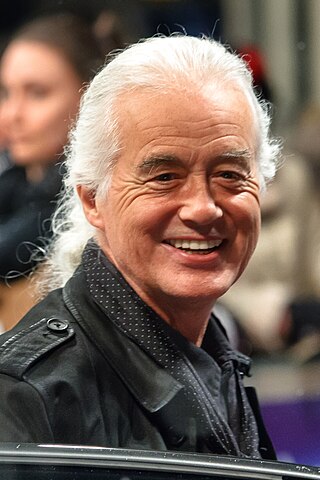
James Patrick Page is an English musician who achieved international success as the guitarist and founder of the rock band Led Zeppelin. Prolific in creating guitar riffs, Page’s style involves various alternative guitar tunings and melodic solos, coupled with aggressive, distorted guitar tones. It is also characterized by his folk and eastern-influenced acoustic work. He is noted for occasionally playing his guitar with a cello bow to create a droning sound texture to the music.
"The Battle of Evermore" is a folk duet sung by Robert Plant and Sandy Denny, included on Led Zeppelin's untitled 1971 album, commonly known as Led Zeppelin IV. The song's instrumentation features acoustic guitar and mandolin playing, while the lyrics allude to J. R. R. Tolkien's fantasy novel The Lord of the Rings.
A plant is a kingdom of mainly multicellular, predominantly photosynthetic eukaryotes.
"Kashmir" is a song by the English rock band Led Zeppelin. Included on their sixth album Physical Graffiti (1975), it was written by Jimmy Page and Robert Plant with contributions from John Bonham over a period of three years with lyrics dating to 1973.
"Achilles Last Stand" is a song by the English rock group Led Zeppelin released as the opening track on their seventh studio album, Presence (1976). Guitarist Jimmy Page and singer Robert Plant began writing the song during the summer of 1975 and were influenced by Eastern music, mythology, and exposure to diverse cultures during their travels. At roughly ten-and-a-half minutes, it is one of the group's longest studio recordings and one of their most complex, with interwoven sections and multiple, overdubbed guitar parts.
"No Quarter" is a song by Led Zeppelin that appears on their 1973 album Houses of the Holy. It was written by John Paul Jones, Jimmy Page, and Robert Plant. The song became a centerpiece at all Led Zeppelin concerts thereafter, until their final tour. It appears in both the film versions and both live album versions of The Song Remains the Same, released in 1976 and expanded in 2007. It appeared once more in 1994 on Page and Plant's reunion album as the title track. It also appears on Led Zeppelin's 2012 live album Celebration Day, which documented their 2007 reunion performance at the O2 Arena in London. It was re-released on the deluxe edition of Houses of the Holy.

Page and Plant were an English rock band active between 1994 and 1998. The group consisted of guitarist Jimmy Page and vocalist Robert Plant, accompanied by bassist Charlie Jones and drummer Michael Lee. Formed in 1994 for an MTV Unplugged reunion, Page and Plant released the platinum-selling live album No Quarter, featuring both new material and middle eastern-influenced covers of classic Led Zeppelin songs. Following the success of the live album, they embarked on a world tour featuring a full orchestra.
"The Rain Song" is a song by the English rock band Led Zeppelin. It was released in March 1973 as the second track on their fifth album, Houses of the Holy.

No Quarter is a live album by Jimmy Page and Robert Plant, both formerly of English rock band Led Zeppelin. It was released by Atlantic Records on 14 October 1994. The long-awaited reunion between Jimmy Page and Robert Plant occurred on a 90-minute "UnLedded" MTV project, recorded in Morocco, Wales, and London. It was not a reunion of Led Zeppelin, however, as former bassist and keyboardist John Paul Jones was not present. In fact, Jones was not even told about the reunion by his former bandmates. He later commented that he was unhappy about Plant and Page naming the album after "No Quarter", a Led Zeppelin song which was largely his work.
"Thank You" is a song by the English rock band Led Zeppelin from their second studio album Led Zeppelin II (1969). It was written by Robert Plant and Jimmy Page, and produced by Page.
"Tangerine" is a folk rock song by the English band Led Zeppelin. Recorded in 1970, it is included on the second, more acoustic-oriented side of Led Zeppelin III (1970). The plaintive ballad reflects on lost love and features strummed acoustic guitar rhythm with pedal steel guitar.
"The Maid Freed from the Gallows" is one of many titles of a centuries-old folk song about a condemned maiden pleading for someone to buy her freedom from the executioner. In the collection of ballads compiled by Francis James Child in the late 19th century, it is indexed as Child Ballad number 95; 11 variants, some fragmentary, are indexed as 95A to 95K. The Roud Folk Song Index identifies it as number 144.

Led Zeppelin's 1973 North American Tour was the ninth concert tour of North America by the English rock band. The tour was divided into two legs, with performances commencing on 4 May and concluding on 29 July 1973. Rehearsals took place at Old Street Film Studios in London.
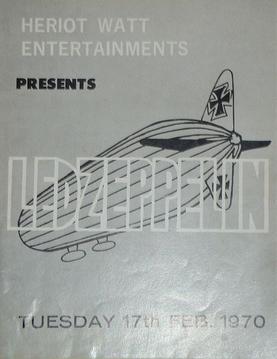
Led Zeppelin's 1970 United Kingdom Tour was a concert tour of the United Kingdom by the English rock band. The tour commenced on 7 January and concluded on 17 February 1970.

"It's Nobody's Fault but Mine" or "Nobody's Fault but Mine" is a song first recorded by gospel blues artist Blind Willie Johnson in 1927. It is a solo performance with Johnson singing and playing slide guitar. The song has been interpreted and recorded by numerous musicians in a variety of styles, including Led Zeppelin on their 1976 album Presence.